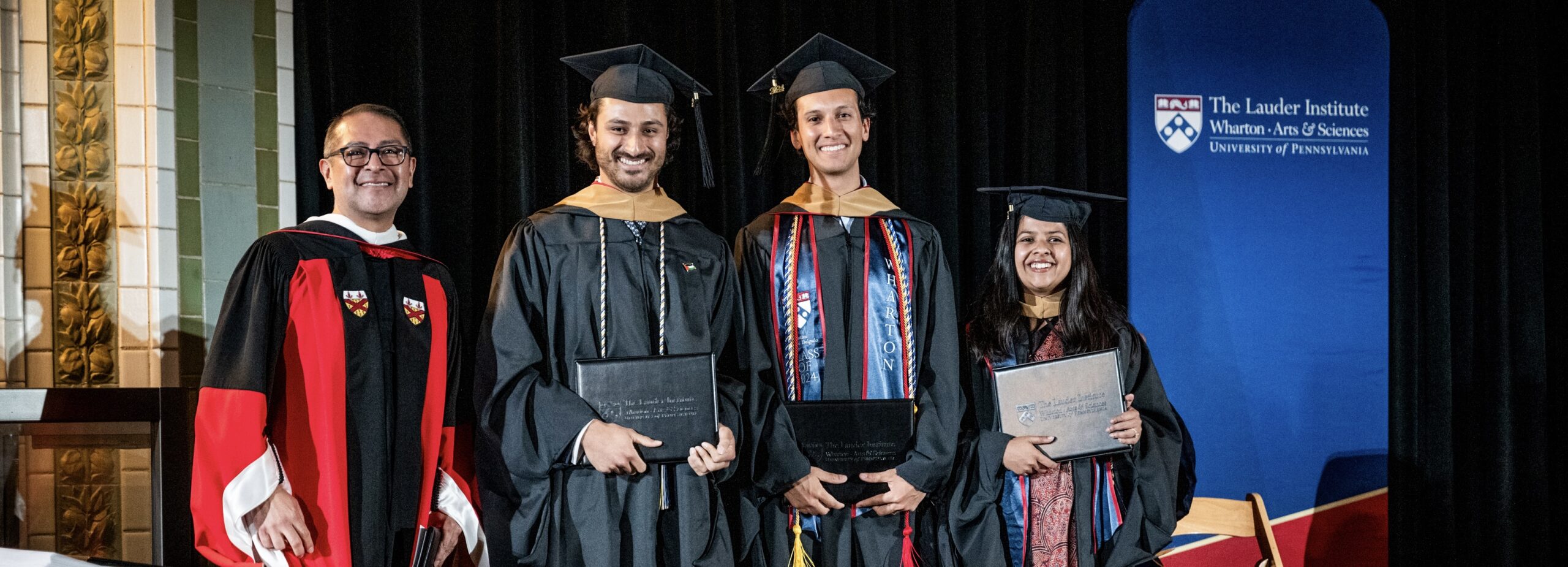Master’s Thesis Winners Discuss Their Research

Each year at graduation, the Lauder Institute recognizes academic excellence by awarding prizes to the three most outstanding master’s theses completed by Lauder students in fulfillment of their Master’s in International Studies degree. Research papers are anonymously reviewed by a committee of faculty from the University of Pennsylvania. This year, we sat down with the winner and two runners-up of the Reginald H. Jones Research Prize to learn about what inspired the topics for their winning papers, the challenges they encountered during their research, the resources they found most useful in their writing, and how the thesis has contributed to their professional development.

KARIM STINNER
SAMENA PROGRAM (ARABIC)
SECOND RUNNER-UP, REGINALD H. JONES RESEARCH PRIZE
In his paper, “Exploring the Role of Shonen Anime in Promoting Saudi Arabia’s National Vision Among its Millennial Population: A Government Strategy?,” Karim Stinner examines the role of government in adapting shonen anime for local audiences in Saudi Arabia. A Japanese action/adventure genre for young males, shonen anime is widely broadcast throughout Arabic-speaking countries with high-quality dubbing. Stinner’s research highlights significant differences between the storylines of the Arabic dubs and the original Japanese versions, noting government efforts to culturally adapt anime to promote socially and culturally acceptable themes in line with national transformation goals.

CRISTIAN NAVARRO DELGAGO
EUROPE PROGRAM (FRENCH)
FIRST RUNNER-UP, REGINALD H. JONES RESEARCH PRIZE
In his paper, “Atoning for the Past in a Fractured Present: Unsettled Debates on National Memory Laws in France and Italy,” Cristian Navarro Delgado examines how France and Italy have attempted to confront their contentious histories through a series of laws passed in the 1990s and early 2010s. These memory laws, related to the Holocaust and colonialism, are legal measures enacted by governments to control the public discussion, portrayal, and commemoration of historical events. They aim to shape collective memory by endorsing specific historical narratives while restricting others. In asking the question of whether legislating history is an effective means of reconciling with the past, Navarro Delgado explores the duty of remembrance, the construction of national narratives, and the limits of free speech.

MAITHILI APPALWAR
SAMENA PROGRAM (HINDI)
WINNER, REGINALD H. JONES RESEARCH PRIZE
Inspired by a lifelong passion for books, Maithili Appalwar investigates how and why independent bookstores in India have flourished in her paper, “Turning the Page: Unraveling the Strategies and Challenges Behind the Resilience of Independent Bookstores in India.” Through fieldwork and interviews with booksellers and consumers throughout Delhi and Mumbai, Appalwar explores how independent bookstores transcend their commercial role to become cultural and community hubs, maintaining their relevance in a competitive and rapidly growing economy.



